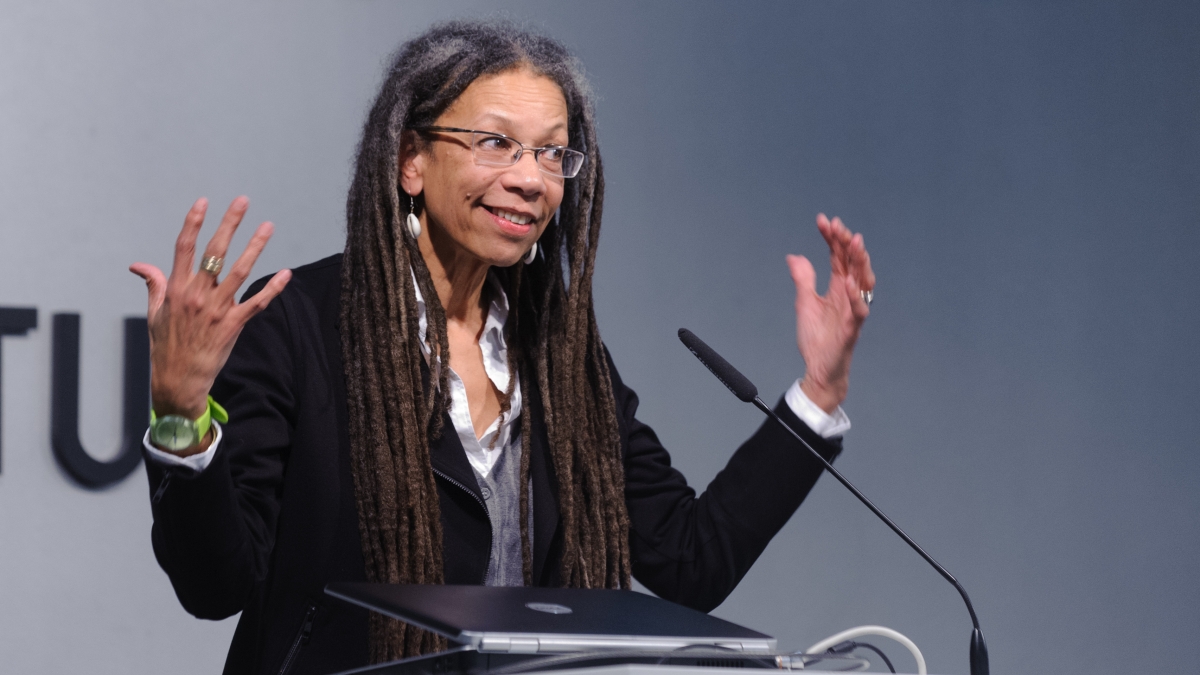Award-winning geographer, social change agents headline Ethnic Studies Week

Socially embedded, use-inspired research that fuses intellectual disciplines, leverages place, and can move society forward has always defined the scholarship of Ruth Wilson Gilmore, who will be at Arizona State University on Monday, Oct. 1, to present the keynote lecture as part of the university’s third annual Ethnic Studies Week events.
Her address, titled “The Birth of Ethnic Studies,” will take place from 5 to 6:30 p.m., in the Memorial Union, Turquoise Room 220, on ASU’s Tempe campus.
Gilmore is professor of geography in the Earth and Environmental Studies doctoral program at the Graduate Center of the City University of New York, and a visiting professor at Maumaus School of Visual Arts in Lisbon. She works regularly with community groups and grassroots organizations and is known as a scholar whose research is broadly accessible.
Her wide-ranging research interests include race and gender, labor and social movements, uneven development, and the African diaspora.
Gilmore’s prize-winning 2007 book, “Golden Gulag: Prisons, Surplus, Crisis, and Opposition in Globalizing California,” examined how political and economic forces produced California’s prison boom. In its review, the San Francisco Chronicle said: "Now, if you want to understand why progressive California leads the Western world with its regressive system of punishment, Gilmore's ‘Golden Gulag’ is the first must-read book of the 21st century.”
Her work has been highly influential to social justice organizations that have successfully pressured the state of California to reduce its prison population, incarceration rates, and corrections costs while improving public safety.
Gilmore’s honors and awards reflect the impact she has had in the academy and in the greater community. They include a grant from the National Endowment for the Arts, a Soros Justice Senior Fellowship, the James Blaut Award for Critical Geography, the Ralph Santiago Abascal Award for Economic and Environmental Justice, and the Lora Romero Best Book Prize, as well as honors from many community justice organizations, the California State Senate, the Los Angeles Board of Supervisors, and the State of Connecticut. Gilmore was president of the American Studies Association in 2010-2011.
Before joining the Graduate Center at CUNY, Gilmore was at the University of Southern California, where she taught courses in race and ethnicity, economic geography, and political geography, and was the founding chair of the Department of American Studies and Ethnicity.
“Ruth Wilson Gilmore is one of the most important theorists writing about racism, state violence, and organizing for social justice today,” observes Wendy Cheng, assistant professor of Asian Pacific American Studies and Justice and Social Inquiry, and an organizer of the week’s events. “Her work resonates not only with a wide range of scholars who are trying to puzzle out the ‘big’ questions – about power, politics, economics – but also with people who are living the hard realities of these questions in their everyday lives. Her lecture should be highly relevant and illuminating to the struggles we are currently facing in Arizona.”
ASU’s Ethnic Studies Week events will kick off earlier on Oct.1, with a screening and discussion of the film "Chunky: The Making of a Social Activist," from 11 a.m. to 3 p.m., in the Memorial Union Alumni Room, on ASU’s Tempe campus. The documentary is a work in progress by Paul Espinosa, award-winning filmmaker and ASU professor of Transborder Studies. The film tells the story of Ramón “Chunky” Sanchez – a southern California musician, composer, and son of farm-working parents. The documentary examines how Sanchez’s personal development as an activist is interwoven with the broader history of the Chicana/o community in the United States and the unique cultural dynamics of the U.S.-Mexican border.
The film will be preceded by a presentation by Estevan César Azcona, adjunct assistant professor of Mexican American Studies at the University of Houston. It will be followed by a lunch and panel discussion in which Espinosa and Azcona will be joined by Luis Alvarez, associate professor of history at the University of California, San Diego, and Michelle Téllez, assistant professor, ASU’s New College of Interdisciplinary Arts and Sciences.
On Tuesday, Oct. 2, at 5 p.m., professor of English Lee Bebout will lead a screening of the 2006 HBO film “Walkout” in Bateman Physical Sciences Center H Wing, room 152. The film depicts the efforts by students and community members to achieve educational equality in Los Angeles in the late 1960s. In many ways, this film illustrates one of the key origin points for ethnic studies as a field today.
The Ethnic Studies Week events close on Thursday, Oct. 4, with a panel discussion titled “The Struggle for Educational Equality,” to take place at 5 p.m., in Coor Hall, room L1-20. Discussion will focus on the role of ethnic studies in public schools, strategies for its incorporation, and lessons and differences from past efforts. Panelists will be former teacher Sal Castro, who helped organize the efforts for educational reform depicted in the film "Walkout" (to be viewed on Oct. 2, as noted above), Sean Arce, an educator who is engaged in the struggle to reinstate Mexican American studies in Tucson Unified School District, and Kim Dominguez, a member of UNIDOS – a youth organization from Tucson working to protect educational human rights.
ASU’s Ethnic Studies Week events are co-sponsored by the School of Social Transformation, the School of Transborder Studies, the Department of English, and the Institute for Humanities Research – all units of the College of Liberal Arts and Sciences – as well as the School of Letters and Sciences and the New College of Interdisciplinary Arts and Sciences.
All of the week's events are free, but admission to the “Chunky” film screening requires registration and RSVP.